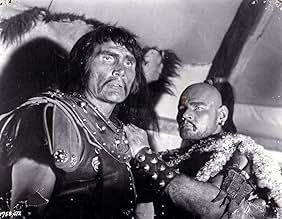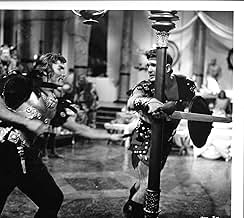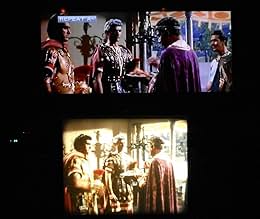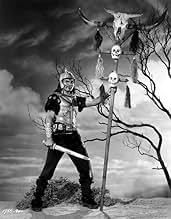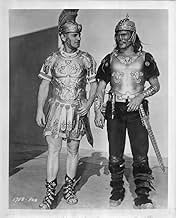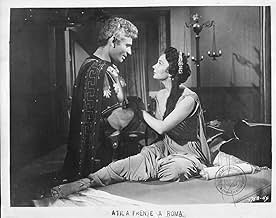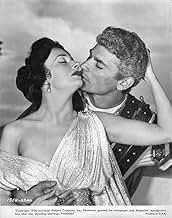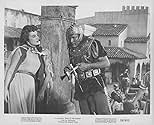With the Roman Empire divided, Attila the Hun hopes to conquer. In his way are a brave centurion, a beautiful princess...and Christianity.With the Roman Empire divided, Attila the Hun hopes to conquer. In his way are a brave centurion, a beautiful princess...and Christianity.With the Roman Empire divided, Attila the Hun hopes to conquer. In his way are a brave centurion, a beautiful princess...and Christianity.
Ludmilla Tchérina
- Princess Pulcheria
- (as Ludmilla Tcherina)
Robert Bice
- Chilothe
- (as Robo Bechi)
Featured reviews
At 7:05 pm on Saturday, 1 May 1976, BBC 1 showed the complete and uncut version of Sign of the Pagan. Puzzlingly, this was probably the last time that anyone was allowed to see Ludmilla Tcherina's exotic dance number. For reasons known only to the Universal studios, that whole sequence has been deleted from subsequent television showings, both on American station AMC and Britain's Channel 4. Nor do DVD releases contain the dance, even though the main title still credits Kenny Williams as choreographer, leaving viewers wondering what he could have possibly choreographed. Most surprising of all is the 2011 German DVD "special edition" which presents both the original wide screen and 4 x 3 versions. Even here, Universal have cleanly cut the dance number from both prints and both languages.
For those who have never seen the sequence, Attila has just won the palace show fight with Herculanas. After that, the Emperor commands his sister, the Princess Pulcheria, to dance for the visiting barbarians. For the first 50 seconds she performs a graceful and dignified piece of ballet which the barbarians obviously find boring. Therefore, the Emperor tells a servant, "Advise my sister this is not suited to barbarian taste." So ordered, the Princess switches to a more raunchy routine that the visitors find much more enjoyable. This lasts about two minutes. Few genre fans would argue that, in both the Hollywood and Italian epics, the exotic dance interlude is something of a highlight. We get to see beautiful girls in eye-catching costumes, always accompanied by some classy music. Indeed, the ballet score we hear (or used to hear) from Salter and Skinner in Sign of the Pagan is arguably the best music they ever composed.
Universal obviously hope no-one's going to notice what they've done, but why did they do it in the first place? One can only theorize. Perhaps the film was cut at some stage to fit into a fixed television slot. Or maybe the dance was excluded to make the film more suitable for children's matinees. Then nobody remembered to put the scene back? A somewhat wilder theory is that it's a rights issue. Remembering how the Gershwin estate, not liking the Porgy and Bess movie, have tried for years to prevent anyone seeing it, could Ludmilla Tcherina and her estate have somehow bought out this dance scene and are now withholding it because it does not enhance her memory as a classical ballerina? But surely Universal, with all their wealth, would hardly spoil one of their classics just to grab a few dollars?
Whatever the reason, most fans will agree that missing scenes in movies are a continuing source of irritation. Come on, Universal, put it back!
For those who have never seen the sequence, Attila has just won the palace show fight with Herculanas. After that, the Emperor commands his sister, the Princess Pulcheria, to dance for the visiting barbarians. For the first 50 seconds she performs a graceful and dignified piece of ballet which the barbarians obviously find boring. Therefore, the Emperor tells a servant, "Advise my sister this is not suited to barbarian taste." So ordered, the Princess switches to a more raunchy routine that the visitors find much more enjoyable. This lasts about two minutes. Few genre fans would argue that, in both the Hollywood and Italian epics, the exotic dance interlude is something of a highlight. We get to see beautiful girls in eye-catching costumes, always accompanied by some classy music. Indeed, the ballet score we hear (or used to hear) from Salter and Skinner in Sign of the Pagan is arguably the best music they ever composed.
Universal obviously hope no-one's going to notice what they've done, but why did they do it in the first place? One can only theorize. Perhaps the film was cut at some stage to fit into a fixed television slot. Or maybe the dance was excluded to make the film more suitable for children's matinees. Then nobody remembered to put the scene back? A somewhat wilder theory is that it's a rights issue. Remembering how the Gershwin estate, not liking the Porgy and Bess movie, have tried for years to prevent anyone seeing it, could Ludmilla Tcherina and her estate have somehow bought out this dance scene and are now withholding it because it does not enhance her memory as a classical ballerina? But surely Universal, with all their wealth, would hardly spoil one of their classics just to grab a few dollars?
Whatever the reason, most fans will agree that missing scenes in movies are a continuing source of irritation. Come on, Universal, put it back!
Made the same year as another sword and sandal movie dealing with the same subject ,"Attila Flagello Di Dio" (starring Anthony Quinn and Sophia Loren),it is an icily impersonal movie from Douglas Sirk.It's watchable ,but it could have been done by anyone at all.Sirk's métier was melodrama (he was the master of the genre in the fifties) and western ("Taza,son of Cochise" ) and epics are not obviously his forte.
Although Jack Palance was potentially as ideal as Anthony Quinn to portray the king of the Huns,the screenwriters made him a too polite ,too sentimental ,not bestial enough character (just compare with Anthony Quinn's performance,in a movie which was not better though).
Sirk did not seem to put of lot of effort into his work:"Christian" best describes it:the thunderbolt,the Roman talking about the Virgin and her son to the pagan daughter ,the pope 's intervention (there's a similar scene in the Italian movie),the final victory which was given by "their" God...
Although Jack Palance was potentially as ideal as Anthony Quinn to portray the king of the Huns,the screenwriters made him a too polite ,too sentimental ,not bestial enough character (just compare with Anthony Quinn's performance,in a movie which was not better though).
Sirk did not seem to put of lot of effort into his work:"Christian" best describes it:the thunderbolt,the Roman talking about the Virgin and her son to the pagan daughter ,the pope 's intervention (there's a similar scene in the Italian movie),the final victory which was given by "their" God...
According to Marilyn Kirk's biography of Jeff Chandler, Chandler was originally offered the role of Attila in Sign Of The Pagan. I think he was wise to decline as he would have been ill suited for the part. But I think Jeff would have been smart to skip this one altogether. He's rather colorless as the centurion who becomes Captain-General of the Roman forces.
When Jack Palance is on screen as Attila the Hun there ain't a stick of furniture safe in his view. It's that kind of part so sit back and enjoy. In fact Anthony Quinn took the same approach when he did Attila in a film that came out around the same time.
Nothing remotely historically accurate about Sign Of The Pagan other than Attila's meeting with Pope Leo I and his turning back from his conquest of Rome. Moroni Olsen in his farewell big screen performance is is the Pope. No one knows what was actually said so its is all open to speculation.
If you love scenery chewing acting when it's called for than Sign Of The Pagan is your kind of film.
When Jack Palance is on screen as Attila the Hun there ain't a stick of furniture safe in his view. It's that kind of part so sit back and enjoy. In fact Anthony Quinn took the same approach when he did Attila in a film that came out around the same time.
Nothing remotely historically accurate about Sign Of The Pagan other than Attila's meeting with Pope Leo I and his turning back from his conquest of Rome. Moroni Olsen in his farewell big screen performance is is the Pope. No one knows what was actually said so its is all open to speculation.
If you love scenery chewing acting when it's called for than Sign Of The Pagan is your kind of film.
Very enjoyable Douglas Sirk one and only foray into the sword and sandal genre. Competently made, it has a lush look though obviously made on a small budget. With the stilted dialogue one might expect of such a saga, it somehow remains credible though at times teeters precariously on the borders of camp.
Jeff Chandler turns in a solid performance delivering his lines with diction suited to Shakespeare. Panther like Jack Palance sporting a Fu Manchu moustache is perfectly suited to playing Atilla the Hun which he does with much relish. Despite the numerous forgettable roles in equally numerous trivial movies, one senses that there was something there that never quite came to fruition. The closest he came to really great acting was "The Big Knife" made the following year.
Although Sirk wasn't originally allotted to this movie, it would seem he was willing to try his hand in a genre new to him. As with his only western "Taza Son of Cochise", he proved himself able to work in the genre as well as most, though added little extra of any note.
Expertly filmed by the great Russell Metty who Sirk wisely used on most of his movies.
Jeff Chandler turns in a solid performance delivering his lines with diction suited to Shakespeare. Panther like Jack Palance sporting a Fu Manchu moustache is perfectly suited to playing Atilla the Hun which he does with much relish. Despite the numerous forgettable roles in equally numerous trivial movies, one senses that there was something there that never quite came to fruition. The closest he came to really great acting was "The Big Knife" made the following year.
Although Sirk wasn't originally allotted to this movie, it would seem he was willing to try his hand in a genre new to him. As with his only western "Taza Son of Cochise", he proved himself able to work in the genre as well as most, though added little extra of any note.
Expertly filmed by the great Russell Metty who Sirk wisely used on most of his movies.
Even for an epic, at 92 minutes this movie is quite short, but hey it is a very enjoyable movie regardless. Yes even with the occasionally muddled plot and dull performance of Jeff Chandler.
Sign of the Pagan is an example of a movie that is strikingly photographed in early CinemaScope, lustily staged by the director Douglas Sirk and terrifically scored. And there is some nice dialogue as well, not Oscar-worthy material perhaps but nice enough and the pacing wasn't too bad either. It is the performance of Jack Palance though that takes centre stage, he portrays Atila the King of the Huns as a ruthless and ferocious barbarian, and Palance seems to be having a whale of a time, it was quite simply a hugely enjoyable performance.
Overall, not absolutely brilliant but very enjoyable even with its faults. 7/10 Bethany Cox
Sign of the Pagan is an example of a movie that is strikingly photographed in early CinemaScope, lustily staged by the director Douglas Sirk and terrifically scored. And there is some nice dialogue as well, not Oscar-worthy material perhaps but nice enough and the pacing wasn't too bad either. It is the performance of Jack Palance though that takes centre stage, he portrays Atila the King of the Huns as a ruthless and ferocious barbarian, and Palance seems to be having a whale of a time, it was quite simply a hugely enjoyable performance.
Overall, not absolutely brilliant but very enjoyable even with its faults. 7/10 Bethany Cox
Did you know
- TriviaUniversal International's first film in CinemaScope.
- GoofsAll of the mounted troops have stirrups, which would not come into use in Europe for at least another four hundred years.
- Quotes
Pope Leo I: Rome is a Christian city, and the Temple of God!
- Crazy creditsAfter the list of actors at the start of the film it says: "AND Statesmen, Citizens, Soldiers of the Armies of the Roman Empire and the Hordes of Attila"
- ConnectionsReferenced in Pardon My Genie: Sister, Dear Sister (1972)
- How long is Sign of the Pagan?Powered by Alexa
Details
- Release date
- Country of origin
- Language
- Also known as
- Attila, der Hunnenkönig
- Filming locations
- Production company
- See more company credits at IMDbPro
Box office
- Budget
- $1,300,000 (estimated)
- Runtime
- 1h 32m(92 min)
Contribute to this page
Suggest an edit or add missing content

